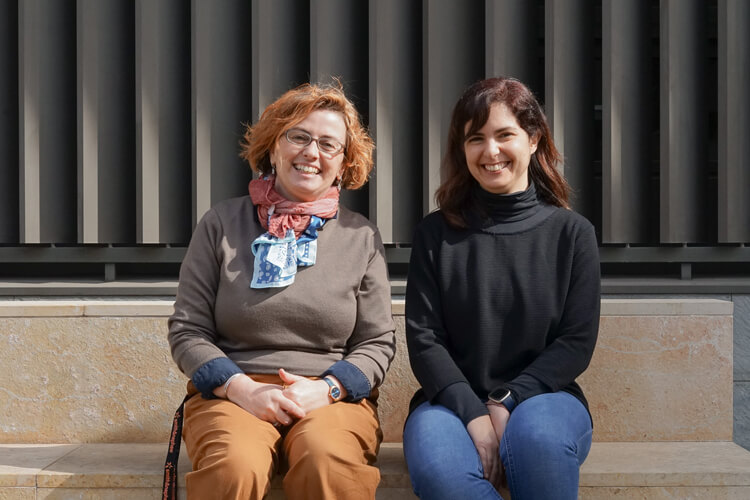Research Groups led by women

Two female IQS researchers and professors lead two research groups at the university. They are Dr Ana Belén Cuenca, coordinator of the Chemical Reactions for Innovative Solutions group (CRISOL), and Dr Meritxell Sáez, coordinator of the Applied Data Analytics and Modelling Group (ADAMIQS).
CRISOL Group
The new research group Chemical Reactions for Innovative Solutions was founded with the aim of consolidating a strong, young research team that can provide innovative chemical tools to offer solutions to many of the challenges in Molecular Science, a discipline that is at the heart of key activities for society such as Medical and Process Chemistry and Materials Science. Another one of the group’s areas of expertise is Flow Chemistry and its use in sustainable chemical processes.
The members of the group, who are highly recognized in the world of research, are active partners both with Spanish and international universities and research centres, as well as with companies in sectors such as pharmaceuticals or agrochemicals. Currently, this group is working on two research projects: the BISi-Bonds project, funded by the Spanish State Research Agency (AEI), and the European NextGenPS project.
This group is led by Dr Ana Belén Cuenca, full professor and director of the Department of Organic and Pharmaceutical Chemistry at the IQS School of Engineering. Dr Cuenca is an expert in the development of new synthetic methodologies based on the use of compounds with halogen atoms (mostly iodine), boron, and silicon, and in applying them in the synthesis and development of new platforms with biological interest.
Dr Cuenca joined the IQS Department of Organic and Pharmaceutical Chemistry in 2016, which she now leads. She is a professor in areas that are based on Organic Chemistry and, for more than six years she has led, in a close relationship with CSIC researcher Dr Alexandr Shafir, a relatively new research team formed by young researchers who share a clear passion for methodological organic chemistry.
In the words of Dr Cuenca, “for me, it’s a great privilege to be able to join the group of people at IQS every day and strive to share this fantastic professional path with new generations who have placed their trust in us.”
ADAMIQS Group
The Applied Data Analytics and Modelling (ADAMIQS) research group was recognized as an emerging group in the last AGAUR call for proposals. It is formed by a research team of experts in the analysis of data and modelling applied to various areas of knowledge such as biosciences, chemistry, engineering, and social sciences, and the group works in close collaboration with other research institutes such as the Barcelona Supercomputing Center (BSC). Other areas of specialization within the group include methods for designing and optimizing experiments, as well as research in the areas of pedagogy, teaching, and STEM in higher education.
Its members form part of the Department of Quantitative Methods at IQS, bringing together the university’s two schools, the School of Engineering and the School of Management. This multidisciplinary aspect enhances its collaboration with other research groups, as seen with the European project PopMed-Sus, coordinated by the Social, Ethics, and Economics (SEE) group at the IQS School of Management, in which certain ADAMIQS researchers participate.
Currently, the group is working on the Eduparadigms project (Paradigms in the teaching of mathematics and other disciplines), funded by the Spanish State Research Agency.
The coordinator of this group, Dr Meritxell Sáez holds a PhD in mathematics and is a professor of Quantitative Methods at IQS, after joining the school in academic year 2021-2022 following time spent working at the Francis Crick Institute in London. Her area of expertise is mathematical modelling applied to the biology of embryonic development, the theory of biochemical reactions, and algebraic geometry.
“We are a cross-cutting and multidisciplinary group as data can be generated in any field since they are universal, and we always need tools to work with them,” says Dr Sáez. “I would also like to highlight two other things about the ADAMIQS group: the fact that we are a shared group and the fact that we create cohesion between the two IQS schools. In addition, seven out of the ten participating researchers are women! I think this is a very noteworthy characteristic.”

